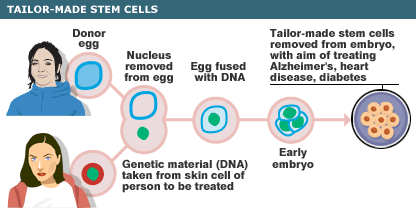Unshackle Science
After South Korean's momentous announcement last week, British scientists were able to repeat the embryonic cloning process as well. With the possibility of patient-grafted organ transplants and tailor-made research subjects, the potential of this method is staggering. More unbelievable is its simplicity.First, take one egg and remove its nucleus (DNA container). Next, extract the DNA from the patient through a non-obtrusive skin cell sample. Finally, place the DNA into the egg and you get embryo cells.

Let me emphasize something here for the genetic novices out there: the results are embryonic cells, not a human being. Cells within a human being are constantly created and destroyed in your body everyday. Every time you exercise, older cells lose oxygen and new cells become oxygen-rich. Every time you bathe skin cells close to the epidermal surface are scraped off and discarded. Every time you take a blood test, countless blood cells perish in a tube.
Let's try using a building analogy. A cell is a stone brick. An embryonic cell is cement. Unlike the brick, embryonic cells can solidify into a variety of building pieces, forming the basis for arches, pillars, beams and of course, bricks. From a mason's viewpoint, the cement is much more flexible than a single brick, being able to fill cracks and outright replace other building structures. The time-consuming part is in mixing the cement and getting just the right consistency of water and stone. Once it is mixed properly, it can be further shaped into whatever is needed.
We'll come back to that. Currently, the House is considering two measures directly affected by the South Korean and British research: 1) lifting the 2001 ban on federal funded embryonic cell research (HR 810) and 2) maintaining discarded human cord blood stem cells (HR 2520). Both of these measures affect the collection and use of embryonic cells and the federal funding therein.
Tom Delay, not exactly the House Ethics Committee's poster-child of morality, had this blurb in the Associated Press:
DeLay, a Texas Republican, called the debate "a necessary and important step in our national conversation about the kind of people we will be, in a world of ever more promising and ever more unnerving medical technology." He equated reducing the funding restrictions imposed by Bush to a "vote to fund with taxpayer dollars the dismemberment of living, distinct human beings for the purposes of medical experimentation."Dismemberment of human beings? If we are to claim these embryonic cells are to be called a human being, then I dare ask where is the Republican legislation to protect skin cells or blood cells, both of which we callously flake off or throw away?
Tom Delay is not the most intelligible opponent of this legislation, but his faulty reasoning is present in many others who truly believe embryonic cell research "destroys life to save other life". There is truly a well-exploited misconception that a group of cells that might form a human being equates to said human being.
Remember, a brick does not a building make, not even a pile of bricks. It is true that a cell is a life, but we destroy many cells every day and our body makes new ones. I don't presume to know when simple cell life ends and a human being's life begins, but I do know a cell is not a human. It is only one piece to a much larger puzzle.
This debate avoids the crux of the issue: cloning of adults. This is the reason why the federal government should lead the way into ethical embryonic cloning, not outlaw it and have it imported from other countries.
I know the Republicans have many friends in the drug industry that would like diabetes, Parkinson's, Alzheimer's, arthritis, and other diseases to stay uncured to maximize their own patents and profits. But I think most Americans disagree. I know I do.
Let your congressional representative know what you feel and drop them a line.
UPDATE: Today the first bill passed 238 to 194, with the president's ominous words: "This bill would take us across a critical ethical line by creating new incentives for the ongoing destruction of emerging human life. Crossing this line would be a great mistake."
Email the president and urge him not to veto this legislation!


1 Comments:
There are embryonic cells involved here, however.
And the current ban on Embryonic Cell Reseach affects funding for this kind of science.
Of course, there are many research labs and companies that would benefit from lifting the ban as well. But I think the drug company lobby has them beat.
Post a Comment
<< Home